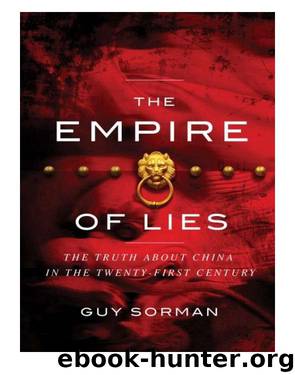Empire of Lies by Guy Sorman

Author:Guy Sorman
Language: eng
Format: epub, azw3
Publisher: Encounter Books
Published: 2010-12-23T05:00:00+00:00
Twenty percent unemployed
Unemployment has been limited to 3.5 percent. At least that’s the official figure, announced at the beginning of each year. The real figure is incalculable. The hundred-million-strong floating population—migrants who travel from place to place, going wherever they can find work or returning to their villages—are neither employed nor unemployed. The same holds true for millions of idle peasants who are either wholly or mostly landless. If they had the freedom to work in the city, they would. So are 20 percent of the Chinese unemployed? It seems plausible. Unemployment affects not just the poor. Two-thirds of China’s engineers, university degree holders, cannot find work commensurate with their qualifications even three years after they finish their studies. Their unemployment has to do with the nature of China’s development, which is based on the massive deployment of unskilled labor rather than the development of research and the service sector, which require more educated manpower. Is it any wonder, then, that so many engineers and technically qualified people leave for the United States and Canada?
As a result, despite of a high growth rate, there is still a dearth of jobs because profits are invested in unproductive ventures. Foreign investment does not generate much employment, either, since overseas companies prefer to set up high-productivity units requiring little labor. And export firms in the textile and IT sectors recruit mostly untrained girls on short-term contracts. There are no jobs for poor peasants, students, or workers laid off by the public factories.
What does Mao Yushi suggest? Nothing original; only that China follow the path of Japan, Taiwan, Singapore, Hong Kong, and Korea—all countries that managed to make good. If export earnings are well spent, employment will follow growth. Developing medium-size towns makes more sense than concentrating capital on the east coast and creating unmanageable agglomerations. In the final analysis, the solution is to invest in human resources, education, and health care, which would reduce social tension and enable China to move from primitive capitalism to sustained development. The first Asian “tigers” based their economies on the quality of their human resources; the Chinese government believes in exploiting labor. Is anyone ready to take up Mao Yushi’s ideas? No, because economic organization is only a reflection of political organization. An urban class dominates the country, bureaucrats run the Party, the peasants have no say, and hence the interests of the establishment dictate economic choices.
Download
This site does not store any files on its server. We only index and link to content provided by other sites. Please contact the content providers to delete copyright contents if any and email us, we'll remove relevant links or contents immediately.
| Arms Control | Diplomacy |
| Security | Trades & Tariffs |
| Treaties | African |
| Asian | Australian & Oceanian |
| Canadian | Caribbean & Latin American |
| European | Middle Eastern |
| Russian & Former Soviet Union |
The Secret History by Donna Tartt(19092)
The Social Justice Warrior Handbook by Lisa De Pasquale(12191)
Thirteen Reasons Why by Jay Asher(8912)
This Is How You Lose Her by Junot Diaz(6889)
Weapons of Math Destruction by Cathy O'Neil(6281)
Zero to One by Peter Thiel(5802)
Beartown by Fredrik Backman(5759)
The Myth of the Strong Leader by Archie Brown(5509)
The Fire Next Time by James Baldwin(5448)
How Democracies Die by Steven Levitsky & Daniel Ziblatt(5219)
Promise Me, Dad by Joe Biden(5154)
Stone's Rules by Roger Stone(5088)
A Higher Loyalty: Truth, Lies, and Leadership by James Comey(4964)
100 Deadly Skills by Clint Emerson(4927)
Rise and Kill First by Ronen Bergman(4790)
Secrecy World by Jake Bernstein(4753)
The David Icke Guide to the Global Conspiracy (and how to end it) by David Icke(4720)
The Farm by Tom Rob Smith(4514)
The Doomsday Machine by Daniel Ellsberg(4490)
